高考一轮复习英语语法专项八:动词词义辨析
- 格式:doc
- 大小:101.00 KB
- 文档页数:9
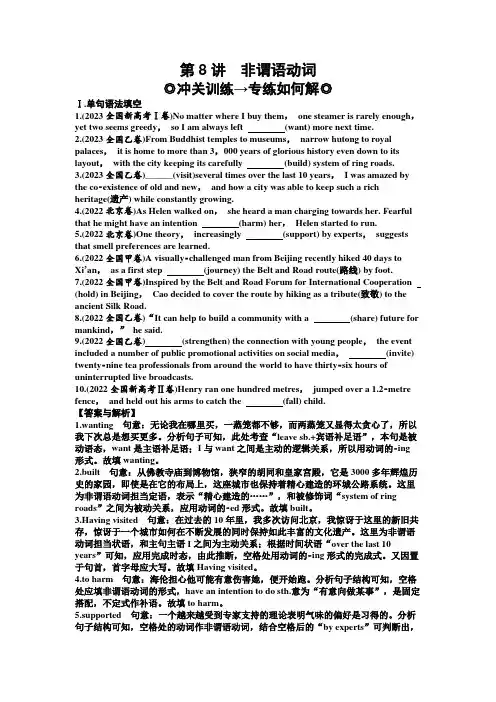
第8讲非谓语动词◎冲关训练→专练如何解◎Ⅰ.单句语法填空1.(2023全国新高考Ⅰ卷)No matter where I buy them,one steamer is rarely enough,yet two seems greedy,so I am always left (want) more next time.2.(2023全国乙卷)From Buddhist temples to museums,narrow hutong to royal palaces,it is home to more than 3,000 years of glorious history even down to its layout,with the city keeping its carefully (build) system of ring roads.3.(2023全国乙卷)______(visit)several times over the last 10 years,I was amazed by the co⁃existence of old and new,and how a city was able to keep such a rich heritage(遗产) while constantly growing.4.(2022北京卷)As Helen walked on,she heard a man charging towards her. Fearful that he might have an intention (harm) her,Helen started to run.5.(2022北京卷)One theory,increasingly (support) by experts,suggests that smell preferences are learned.6.(2022全国甲卷)A visually⁃challenged man from Beijing recently hiked 40 days to Xi’an,as a first step (journey) the Belt and Road route(路线) by foot.7.(2022全国甲卷)Inspired by the Belt and Road Forum for International Cooperation (hold) in Beijing,Cao decided to cover the route by hiking as a tribute(致敬) to the ancient Silk Road.8.(2022全国乙卷)“It can help to build a community with a (share) future for mankind,”he said.9.(2022全国乙卷)(strengthen) the connection with young people,the event included a number of public promotional activities on social media,(invite) twenty⁃nine tea professionals from around the world to have thirty⁃six hours of uninterrupted live broadcasts.10.(2022全国新高考Ⅱ卷)Henry ran one hundred metres,jumped over a 1.2⁃metre fence,and held out his arms to catch the (fall) child.【答案与解析】1.wanting句意:无论我在哪里买,一蒸笼都不够,而两蒸笼又显得太贪心了,所以我下次总是想买更多。
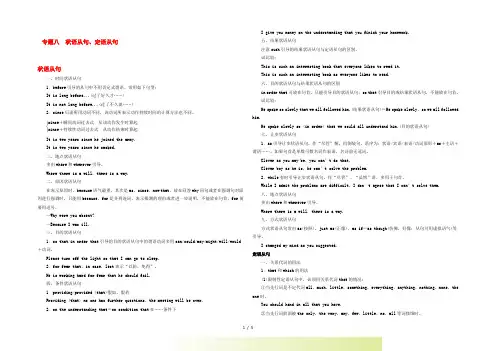
专题八 状语从句、定语从句状语从句一、时间状语从句1.before 引导的从句中不用否定式谓语。
常用如下句型: It is long before...(过了好久才……) It is not long before...(过了不久就……)2.since 后面所用动词不同,该动词所表示动作持续时间的计算方法也不同。
⎩⎪⎨⎪⎧since +瞬间动词过去式从该动作发生时算起since +持续性动词过去式从动作结束时算起It is two years since he joined the army. It is two years since he smoked. 二、地点状语从句多由where 和wherever 引导。
Where there is a will ,there is a way. 二、原因状语从句在表示原因时,because 语气最重,其次是as ,since ,now that ,故在回答why 问句或者在强调句对原因进行强调时,只能用because 。
for 是并列连词,表示推测的理由或者进一步说明,不能放在句首,for 前要用逗号。
—Why were you absent? —Because I was ill. 三、目的状语从句1.so that/in order that 引导的目的状语从句中的谓语动词多用can/could/may/might/will/would +动词。
Please turn off the light so that I can go to sleep. 2.for fear that ,in case ,lest 表示“以防,免得”。
He is working hard for fear that he should fail. 四、条件状语从句1.providing/provided (that)假如,假若Providing (that) no one has further questions ,the meeting will be over. 2.on the understanding that =on condition that 在……条件下I give you money on the understanding that you finish your homework.五、结果状语从句注意such 引导的结果状语从句与定语从句的区别。
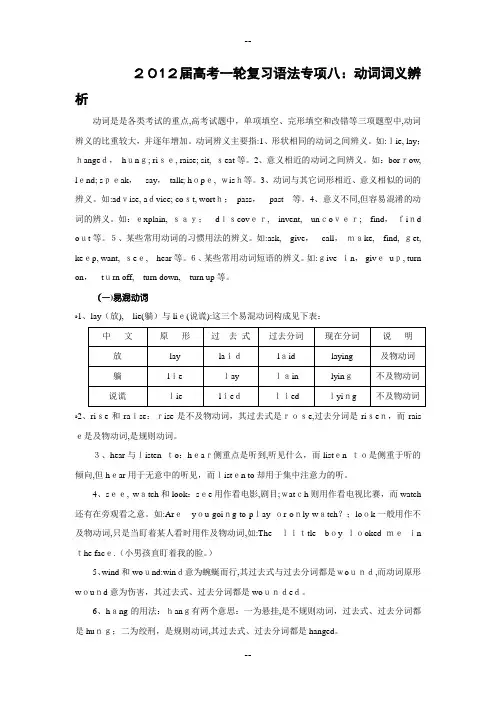
2012届高考一轮复习语法专项八:动词词义辨析动词是是各类考试的重点,高考试题中,单项填空、完形填空和改错等三项题型中,动词辨义的比重较大,并逐年增加。
动词辨义主要指:1、形状相同的动词之间辨义。
如:lie, lay;hanged,hung; rise, raise; sit, seat等。
2、意义相近的动词之间辨义。
如:borrow, lend; speak,say,talk; hope, wish等。
3、动词与其它词形相近、意义相似的词的辨义。
如:advise, advice; cost, worth;pass,past等。
4、意义不同,但容易混淆的动词的辨义。
如:explain, say;discover,invent,uncover;find,find out等。
5、某些常用动词的习惯用法的辨义。
如:ask,give,call,make,find, get, keep, want, see,hear等。
6、某些常用动词短语的辨义。
如:give in,giveup, turn on,turn off,turn down,turn up等。
(一)易混动词ﻩ1、lay(放),lie(躺)与lie(说谎):这三个易混动词构成见下表:ﻩ2、rise和raise:rise是不及物动词,其过去式是rose,过去分词是risen,而rais e是及物动词,是规则动词。
3、hear与listen to:hear侧重点是听到,听见什么,而listen to是侧重于听的倾向,但hear用于无意中的听见,而listen to却用于集中注意力的听。
4、see, watch和look:see用作看电影,剧目;watch则用作看电视比赛,而watch 还有在旁观看之意。
如:Areyou going to play or only watch?;look一般用作不及物动词,只是当盯着某人看时用作及物动词,如:Thelittle boy looked mein the face.(小男孩直盯着我的脸。
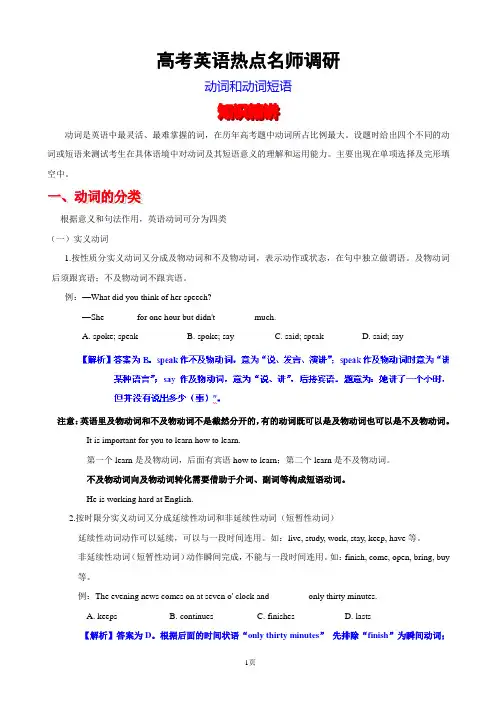
高考英语热点名师调研动词和动词短语动词是英语中最灵活、最难掌握的词,在历年高考题中动词所占比例最大。
设题时给出四个不同的动词或短语来测试考生在具体语境中对动词及其短语意义的理解和运用能力。
主要出现在单项选择及完形填空中。
根据意义和句法作用,英语动词可分为四类(一)实义动词1.按性质分实义动词又分成及物动词和不及物动词,表示动作或状态,在句中独立做谓语。
及物动词后须跟宾语;不及物动词不跟宾语。
例:—What did you think of her speech?—She _______for one hour but didn't ________ much.A. spoke; speakB. spoke; sayC. said; speakD. said; say注意:英语里及物动词和不及物动词不是截然分开的,有的动词既可以是及物动词也可以是不及物动词。
It is important for you to learn how to learn.第一个learn是及物动词,后面有宾语how to learn;第二个learn是不及物动词。
不及物动词向及物动词转化需要借助于介词、副词等构成短语动词。
He is working hard at English.2.按时限分实义动词又分成延续性动词和非延续性动词(短暂性动词)延续性动词动作可以延续,可以与一段时间连用。
如:live, study, work, stay, keep, have等。
非延续性动词(短暂性动词)动作瞬间完成,不能与一段时间连用。
如:finish, come, open, bring, buy 等。
例:The evening news comes on at seven o' clock and ________ only thirty minutes.A. keepsB. continuesC. finishesD. lasts【解析】答案为D。
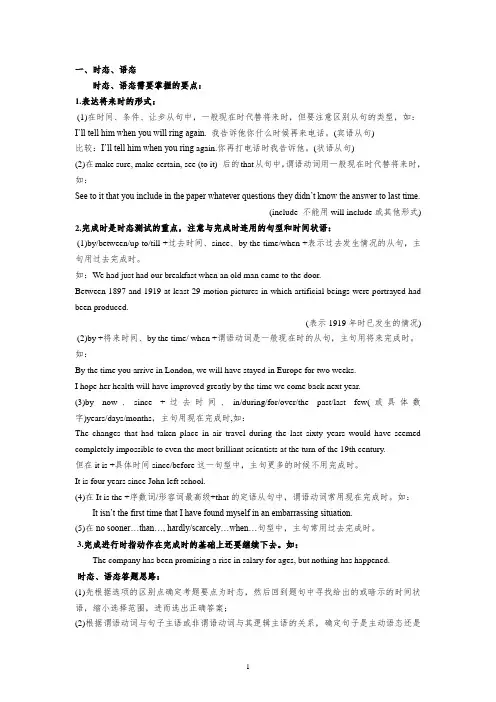
一、时态、语态时态、语态需要掌握的要点:1.表达将来时的形式:(1)在时间、条件、让步从句中,一般现在时代替将来时,但要注意区别从句的类型,如:I’ll tell him when you will ring again. 我告诉他你什么时候再来电话。
(宾语从句)比较:I’ll tell him when you ring again.你再打电话时我告诉他。
(状语从句)(2)在make sure, make certain, see (to it) 后的that从句中,谓语动词用一般现在时代替将来时,如:See to it that you include in the paper whatever questions they didn’t know the answer to last time.(include 不能用will include或其他形式) 2.完成时是时态测试的重点,注意与完成时连用的句型和时间状语:(1)by/between/up to/till +过去时间、since、by the time/when +表示过去发生情况的从句,主句用过去完成时。
如:We had just had our breakfast when an old man came to the door.Between 1897 and 1919 at least 29 motion pictures in which artificial beings were portrayed had been produced.(表示1919年时已发生的情况) (2)by +将来时间、by the time/ when +谓语动词是一般现在时的从句,主句用将来完成时。
如:By the time you arrive in London, we will have stayed in Europe for two weeks.I hope her health will have improved greatly by the time we come back next year.(3)by now、since +过去时间、in/during/for/over/the past/last few(或具体数字)years/days/months,主句用现在完成时,如:The changes that had taken place in air travel during the last sixty years would have seemed completely impossible to even the most brilliant scientists at the turn of the 19th century.但在it is +具体时间since/before这一句型中,主句更多的时候不用完成时。
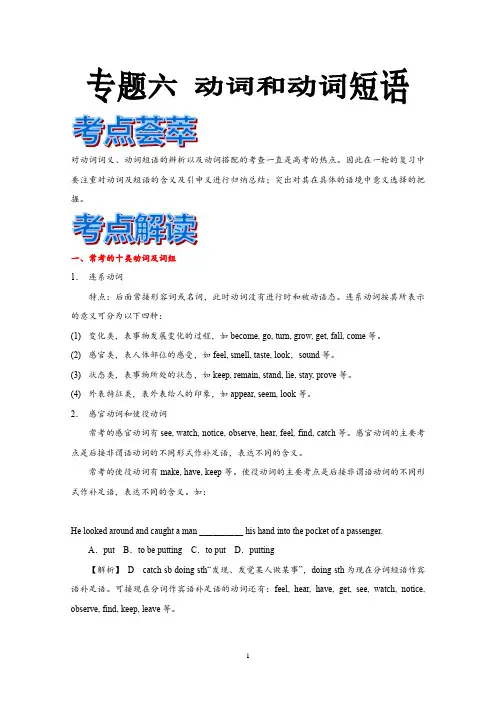
对动词词义、动词短语的辨析以及动词搭配的考查一直是高考的热点。
因此在一轮的复习中要注重对动词及短语的含义及引申义进行归纳总结;突出对其在具体的语境中意义选择的把握。
一、常考的十类动词及词组1.连系动词特点:后面常接形容词或名词,此时动词没有进行时和被动语态。
连系动词按其所表示的意义可分为以下四种:(1)变化类,表事物发展变化的过程,如become, go, turn, grow, get, fall, come等。
(2)感官类,表人体部位的感受,如feel, smell, taste, look,sound等。
(3)状态类,表事物所处的状态,如keep, remain, stand, lie, stay, prove等。
(4)外表特征类,表外表给人的印象,如appear, seem, look等。
2.感官动词和使役动词常考的感官动词有see, watch, notice, observe, hear, feel, find, catch等。
感官动词的主要考点是后接非谓语动词的不同形式作补足语,表达不同的含义。
常考的使役动词有make, have, keep等。
使役动词的主要考点是后接非谓语动词的不同形式作补足语,表达不同的含义。
如:He looked around and caught a man __________ his hand into the pocket of a passenger.A.put B.to be putting C.to put D.putting【解析】D catch sb doing sth“发现、发觉某人做某事”,doing sth为现在分词短语作宾语补足语。
可接现在分词作宾语补足语的动词还有:feel, hear, have, get, see, watch, notice, observe, find, keep, leave等。
3.不用被动语态的动词及动词短语英语中有些动词及短语可用其主动形式表达被动含义。
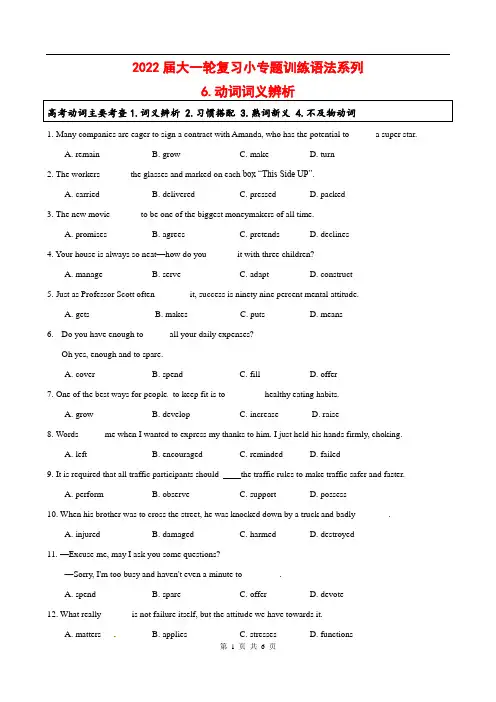
2022届大一轮复习小专题训练语法系列6.动词词义辨析高考动词主要考查1.词义辨析 2.习惯搭配 3.熟词新义 4.不及物动词1. Many companies are eager to sign a contract with Amanda, who has the potential to _____ a super star.A. remainB. growC. makeD. turn2. The workers ______ the glasses and marked on each box “This Side UP”.A. carriedB. deliveredC. pressedD. packed3. The new movie ______ to be one of the biggest moneymakers of all time.A. promisesB. agreesC. pretendsD. declines4. Your house is always so neat—how do you ______ it with three children?A. manageB. serveC. adaptD. construct5. Just as Professor Scott often _______ it, success is ninety nine percent mental attitude.A. getsB. makesC. putsD. means6. --Do you have enough to _____ all your daily expenses?--Oh yes, enough and to spare.A. coverB. spendC. fillD. offer7. One of the best ways for people to keep fit is to ________ healthy eating habits.A. growB. developC. increaseD. raise8. Words _____ me when I wanted to express my thanks to him. I just held his hands firmly, choking.A. leftB. encouragedC. remindedD. failed9. It is required that all traffic participants should the traffic rules to make traffic safer and faster.A. performB. observeC. supportD. possess10. When his brother was to cross the street, he was knocked down by a truck and badly _______.A. injuredB. damagedC. harmedD. destroyed11. —Excuse me, may I ask you some questions?—Sorry, I'm too busy and haven't even a minute to ________.A. spendB. spareC. offerD. devote12. What really ______ is not failure itself, but the attitude we have towards it.A. mattersB. appliesC. stressesD. functions13. When they heard the good news, all of the people in the city held a great party to______ victory.A. celebrateB. congratulateC. memorizeD. receive14. Pairs, without doubt, has absolutely everything for a romantic weekend---hotels, food, and wines to ____ every budget.A. fitB. matchC. suitD. agree15. The loss has not yet been ______ accurately, but it is believed to be well beyond a hundred million dollars.A. calculatedB. consideredC. completedD. controlled16. Some parents are just too protective. They want to________ their kids from every kind of danger, real or imagined.A. spotB. dismissC. shelterD. distinguish17. I ______ you an apology for what I said this morning. Anyway, I meant no offence.A. oweB. makeC. demandD. accept18. Bob said he was going to ______ himself to a vacation in the mountains because he had been so tired.A. pressB. inviteC. devoteD. treat19. The folk song concert was so well ______ that all the tickets were sold out on the first day.A. acceptedB. recognizedC. receivedD. approved20. The good thing about children is that they _____ very easily to new environments.A. adaptB. appealC. attachD. apply21. If you send the application form before 8 o'clock tomorrow morning, I can you an interview.A. instructB. determineC. guaranteeD. recommend22. Your plan, as well as his, sounds original. Bu t the company, I think, won’t ______ either of them, for they are unrealistic.A. abolishB. commentC. approveD. overlook23. To maintain national balance, the government has ______ a policy of encouraging college graduates to take positions in rural areas.A. adoptedB. abandonedC. observedD. modified24. The outbreak of this incident has given us much for thought, forcing us to seriously on the past and the future.A. resembleB. strengthenC. reflectD. shape25. In a formal football match, each team can have three players to _____ their teammates when necessary.A. replaceB. substituteC. representD. exchange26. One reason why the housing prices in big cities are going up all the time is that people are ________ into overcrowded cities in great numbers.A. breakingB. pouringC. fillingD. squeezing27. Do not fear them; for there is nothing covered that will not be ________, and nothing hidden that will not be made known.A. criticizedB. definedC. estimatedD. revealed28. On the way home, a good idea suddenly _____ me - why hot buy Mom a gift for her birthday?A. struckB. beatC. knockedD. attacked29. According to scientists, our mental abilities begin to ______ from the age of 27 after reaching the highest level at 22.A. differB. shrinkC. failD. decline30. Hearing the disappointing news, he was too sad to ____himself.A. containB. includeC. manageD. command2022届大一轮复习小专题训练语法系列(6)答案及解析1. C。
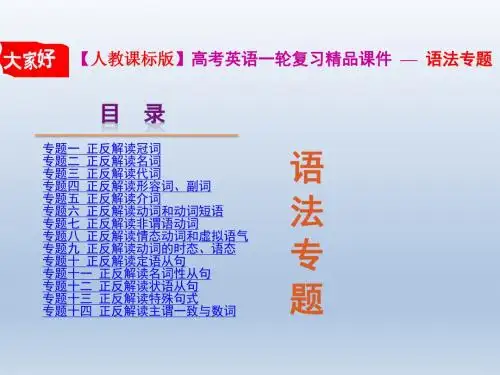
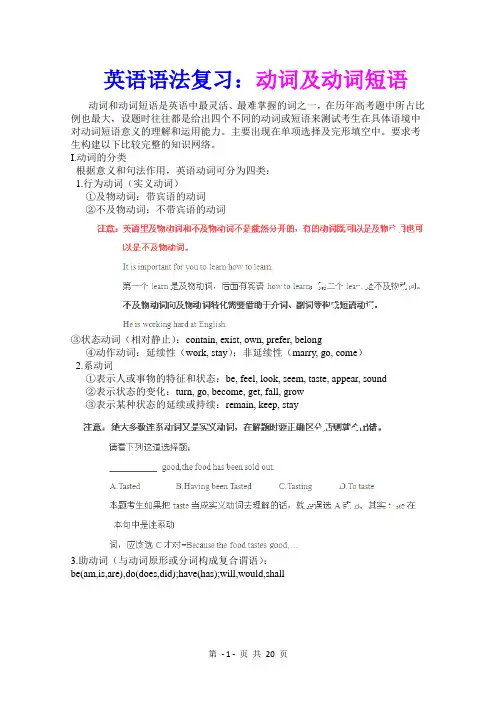
英语语法复习:动词及动词短语动词和动词短语是英语中最灵活、最难掌握的词之一,在历年高考题中所占比例也最大,设题时往往都是给出四个不同的动词或短语来测试考生在具体语境中对动词短语意义的理解和运用能力。
主要出现在单项选择及完形填空中。
要求考生构建以下比较完整的知识网络。
I.动词的分类根据意义和句法作用,英语动词可分为四类:1.行为动词(实义动词)①及物动词:带宾语的动词②不及物动词:不带宾语的动词③状态动词(相对静止):contain, exist, own, prefer, belong④动作动词:延续性(work, stay);非延续性(marry, go, come)2.系动词①表示人或事物的特征和状态:be, feel, look, seem, taste, appear, sound②表示状态的变化:turn, go, become, get, fall, grow③表示某种状态的延续或持续:remain, keep, stay3.助动词(与动词原形或分词构成复合谓语):be(am,is,are),do(does,did);have(has);will,would,shall4.情态动词:can(could),may(might),must,shall(should)等等She turned off all the lights which had been left on. 她关掉了所有还在亮着的灯。
②如果宾语是人称代词,只能放在动词和副词之间。
She gave them away.她送掉了它们。
③同一动词和不同副词搭配时,意义上有很大的差异。
ring back回电话, ring off挂断电话, ring up打电话put away放好, put on穿,上演, put up挂起,举起。
2.动词+介词(及物)I'm looking for my glasses.我在找我的眼镜。
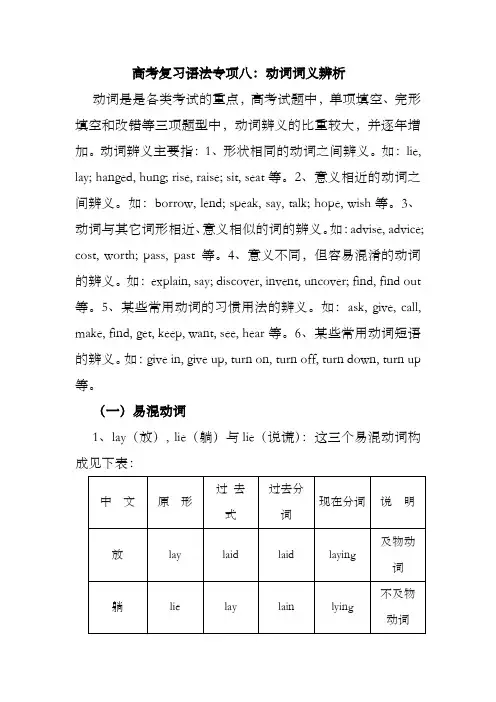
高考复习语法专项八:动词词义辨析动词是是各类考试的重点,高考试题中,单项填空、完形填空和改错等三项题型中,动词辨义的比重较大,并逐年增加。
动词辨义主要指:1、形状相同的动词之间辨义。
如:lie, lay; hanged, hung; rise, raise; sit, seat等。
2、意义相近的动词之间辨义。
如:borrow, lend; speak, say, talk; hope, wish等。
3、动词与其它词形相近、意义相似的词的辨义。
如:advise, advice; cost, worth; pass, past 等。
4、意义不同,但容易混淆的动词的辨义。
如:explain, say; discover, invent, uncover; find, find out 等。
5、某些常用动词的习惯用法的辨义。
如:ask, give, call, make, find, get, keep, want, see, hear等。
6、某些常用动词短语的辨义。
如:give in, give up, turn on, turn off, turn down, turn up 等。
(一)易混动词1、lay(放), lie(躺)与lie(说谎):这三个易混动词构成见下表:中文原形过去式过去分词现在分词说明放lay laid laid laying 及物动词躺lie lay lain lying 不及物动词说谎lie lied lied lying 不及物动词2、rise和raise:rise是不及物动词,其过去式是rose,过去分词是risen,而raise是及物动词,是规则动词。
3、hear与listen to:hear侧重点是听到,听见什么,而listen to是侧重于听的倾向,但hear用于无意中的听见,而listen to 却用于集中注意力的听。
4、see, watch和look:see用作看电影,剧目;watch则用作看电视比赛,而watch还有在旁观看之意。
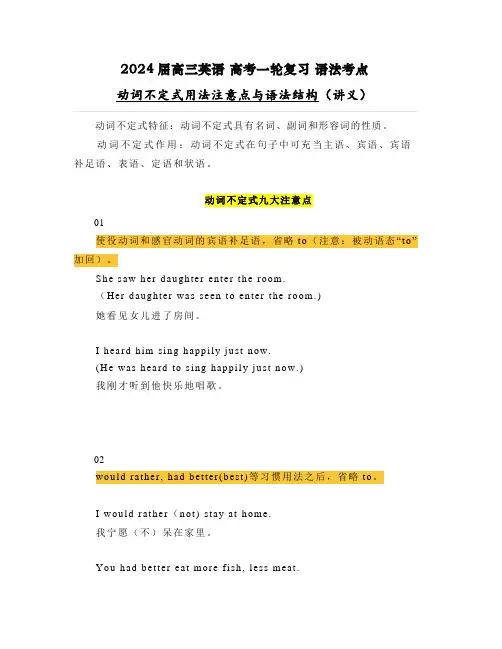
2024届高三英语高考一轮复习语法考点动词不定式用法注意点与语法结构(讲义)动词不定式特征:动词不定式具有名词、副词和形容词的性质。
动词不定式作用:动词不定式在句子中可充当主语、宾语、宾语补足语、表语、定语和状语。
动词不定式九大注意点01使役动词和感官动词的宾语补足语,省略t o(注意:被动语态“t o”加回)。
S h e s a w h e r d au ght e r e nt e r t h e r oom.(H e r d au gh t er wa s s e en t o en t er t h e ro om.)她看见女儿进了房间。
I h e a r d hi m s i n g h ap pi l y j u s t n ow.(H e w as h e a rd t o s i n g h ap pi l y j u s t n ow.)我刚才听到他快乐地唱歌。
02w o ul d r at he r, h ad be t t e r(b e st)等习惯用法之后,省略t o。
I w o u l d r at h e r(not)st a y a t h om e.我宁愿(不)呆在家里。
Y o u h ad b et t e r e at m o re fi sh, l e s s m e at.你最好多吃鱼少吃肉。
03不定式作表语时,它的前面出现d o的各种形式时,省略t o。
T h e on l y t h i n g I c a n do i s w a i t.我唯一能做的事就是等着。
A l l t he y n e e d t o do n ow i s t a k e a b r e ak.现在他们需要的是好好休息。
04“W h y n o t do st h.?” 和“W h y d o n't yo u d o s t h.?”句型中,省略t o。
W h y n o t t r y i t a ga i n?= W h y d o n't yo u t ry i t a ga i n?为什么不再试一下呢?05在w h en, i f, w ha t,as等从句中与l i k e, w a nt, wi s h连用时,省略t o。
2012届高考英语二轮语法复习学案(动词词义辨析)动词是是各类考试的重点,高考试题中,单项填空、完形填空和改错等三项题型中,动词辨义的比重较大,并逐年增加。
动词辨义主要指:1、形状相同的动词之间辨义。
如:lie, lay; hanged, hung; rise, raise; sit, seat等。
2、意义相近的动词之间辨义。
如:borrow, lend; speak, say, talk; hope, wish等。
3、动词与其它词形相近、意义相似的词的辨义。
如:advise, advice; cost, worth; pass, past 等。
4、意义不同,但容易混淆的动词的辨义。
如:ex plain, say; d iscover, invent, uncover; find, find out等。
5、某些常用动词的习惯用法的辨义。
如:ask, give, call, make, find, get, keep, want, see, hear等。
6、某些常用动词短语的辨义。
如:give in, give up, turn on, turn off, turn down, turn up等。
(一)易混动词1、lay(放), lie(躺)与lie(说谎):这三个易混动词构成见下表:2、rise和raise:rise是不及物动词,其过去式是rose,过去分词是risen,而raise是及物动词,是规则动词。
3、hear与listen to:hear侧重点是听到,听见什么,而listen to是侧重于听的倾向,但hear用于无意中的听见,而listen to却用于集中注意力的听。
4、see, watch和look:see用作看电影,剧目;watch则用作看电视比赛,而watch还有在旁观看之意。
如:Are you going to play or only watch?;look一般用作不及物动词,只是当盯着某人看时用作及物动词,如:The little boy looked me in the face.(小男孩直盯着我的脸。
语法专题八、情态动词(常考)考点精讲情态动词表示讲话人的态度、请求、许可、愿望、可能等。
本身具有一定的意义,但不能独立作谓语,没有人称和数的变化,且后面必须跟动词原形。
常考的情态动词有:can/could(能够,可以),may/might(可能,可以),must(必须,一定),should(应该),need(必要),have to(不得不)等。
Need用作情态动词时常用于否定句和疑问句,need还可作实意动词,常用结构need to do sth.考点1.情态动词+动原➢He can play the violin. 他会拉小提琴。
➢It might snow tomorrow. 明天可能下雪。
➢We should respect everyone. 我们应该尊重每一个人。
考点2.常考的一般疑问句的回答—Can you swim?—Yes, I can. /No, I can’t.—May I smoke here?—Yes, you may/can. /Sure. / Certainly. / Of course. /No, you mustn't / can’t.—Must we finish the work at once?—Yes,you must. /No,you needn't. / No,you don't have to.(must引导的一般疑问句的否定回答是常考点)考点3.must必须(强调主观看法)mustn’t表示禁止,不允许➢You must study harder this term. 你们这学期必须更加努力学习。
(说话者的个人看法)➢You mustn’t swim in the river. 你们千万不能去河里游泳。
(这条河禁止游泳)考点4.情态动词表推测表推测:由强到弱肯定:must 准是,一定can 可能could(可能)may (或许) might(大概)否定:can’t 不可能may/ might not 或许不能can 和could 表示推测,can 表示推测时,往往用于否定句和疑问句。
语法专题八倒装句谓语动词放在主语之前的语法现象称为倒装。
倒装可分为完全倒装和部分倒装两种。
完全倒装是指整个谓语置于主语之前,而部分倒装是指将助动词、情态动词或be动词等置于主语之前。
考点一完全倒装1.表示方位的副词(如:there,here,ue,run等不及物动词,可将谓语动词全部置于主语之前。
但主语是人称代词时,不倒装。
There remain the e2.当句首状语为表示地点的介词短语时,也常常用全部倒装。
South of the cit ie a factor3.表语置于句首时,倒装结构为“表语+连系动词+主语”。
1)形容词+连系动词+主语eeting were ome ee bac to the factorIn no cae wi he give it ue a few minute earier,ou woud have een him6.当on所修饰的副词、介词短语或状语从句位于句首时,采用部分倒装形式。
要注意on+主语放句首时不倒装。
On in thi wa can ou earn Engih weOn ou can hee D.ite fing ha become33.(2022·江西白鹭洲中学月考)Mr Lee ha been bu with hi wor thee da and edom ______ to come over to have a chat with meA.have he time B.doe he have timeC.han't he time D.doen't he have time参考答案1.C nor “也不”,表示否定意义的词位于句首,句子用部分倒装,故排除B、D 两项;根据前后时态一致原则,排除A项。
句意:校长不会允许课程的改变,他甚至不会给予考虑。
故选C项。
2.A 句意:直到玛丽第二遍读完她的作文后,她才注意到其中的拼写错误。
英语语法-谓语动词[高考考查分析]动词时态历来是高考考查的重点,为语法填空题必考内容。
通过对近几年高考语法填空题的统计分析得出这样的结论:英语时态虽多,但考向非常集中,最常考的是一般过去时和一般现在时,其次是现在完成时,其他时态考查相对较少。
高考对动词被动语态和主谓一致的考查,大多都和时态结合在一起,以时态的考查为主,语态的考查为辅,单纯考查被动语态和主谓一致的题目较少。
1.动词的时态时态用法一般现在时(1)表示经常性、习惯性动作或状态;(2)表示客观真理、科学事实及自然现象;(3)用于以here,there开头的倒装句中,表示正在发生的动作或状态一般过去时(1)过去发生的一次性或习惯性动作或状态;(2)在时间、条件、让步等状语从句中代替过去将来时现在完成时(1)表示已经完成的某个动作对现在造成的影响或产生的结果;(2)表示开始于过去、持续到现在已经完成或可能持续下去的动作或状态;(3)常用句型:①It/This/That is the first...time that...②It/This/That is the+形容词最高级+名词+that...③It is/has been+一段时间+since...过去完成时(1)表示在过去某个时间以前已完成的动作或存在的状态;(2)常用句型:①hardly/scarcely/rarely...when...和no sooner...than...的主句中;②It/This/That was the first...time that...从句中将来完成时表示到将来某一时间某一动作将会完成,常用时间状语“by+将来某个时间”现在进行时(1)表示说话时或现阶段正在进行的动作;(2)表示近期特定的安排或计划过去进行时表示过去某一时刻正在进行的动作或某一段时间一直在进行的动作将来进行时表示将来某个时刻或阶段正在发生的动作一般将来时(1)will/shall do:①表示单纯的将来事实;②表示临时性决定;(2)特殊表达:①be going to do表示按计划、打算要做某事或有迹象表明要发生某事;②be to do 表示按计划、安排要做某事,或按照职责、义务、规定等应该做某事;③be about to do表示“立即的将来”,不可与具体时间状语连用,但常与并列连词when连用;④一般现在时表将来:表示按规定、计划或时间表将要发生的动作,如航班起飞、列车发车等;⑤现在进行时表将来:表示按最近的计划或安排将要进行的动作,限于go、come、arrive、leave、start等少量动词过去将来时表示从过去某个时间看将要发生的动作或存在的状态(1)被动语态的构成(以do为例)现在过去将来过去将来一般式am/is/are done was/were done will/shall be done would/ should be done进行式am/is/are being done was/were being done完成式have/has been done had been done will/shall have been done would/ should have been done(2)被动语态的用法①不知道谁是动作的执行者,或没有必要指明谁是动作的执行者。
2019届高考英语二轮语法复习学案(动词词义辨析)动词是是各类考试的重点,高考试题中,单项填空、完形填空和改错等三项题型中,动词辨义的比重较大,并逐年增加。
动词辨义主要指:1、形状相同的动词之间辨义。
如:lie, lay; hanged, hung; rise, raise; sit, seat等。
2、意义相近的动词之间辨义。
如:borrow, lend; speak, say, talk; hope, wish等。
3、动词与其它词形相近、意义相似的词的辨义。
如:advise, advice; cost, worth; pass, past 等。
4、意义不同,但容易混淆的动词的辨义。
如:ex plain, say; d iscover, invent, uncover; find, find out 等。
5、某些常用动词的习惯用法的辨义。
如:ask, give, call, make, find, get, keep, want, see, hear 等。
6、某些常用动词短语的辨义。
如:give in, give up, turn on, turn off, turn down, turn up 等。
(一)易混动词1、lay(放), lie(躺)与lie(说谎):这三个易混动词构成见下表:2、rise和raise:rise是不及物动词,其过去式是rose,过去分词是risen,而raise是及物动词,是规则动词。
3、hear与listen to:hear侧重点是听到,听见什么,而listen to是侧重于听的倾向,但hear 用于无意中的听见,而listen to却用于集中注意力的听。
4、see, watch和look:see用作看电影,剧目;watch则用作看电视比赛,而watch还有在旁观看之意。
如:Are you going to play or only watch?;look一般用作不及物动词,只是当盯着某人看时用作及物动词,如:The little boy looked me in the face.(小男孩直盯着我的脸。
情态动词主要用来表示说话人的情感、态度等,是中学英语语法的重点,也是高考的热点,是单项填空必考的一个知识点。
情态动词在近五年高考中主要考查四点:情态动词表示推测和可能性的用法;情态动词与虚拟语气;情态动词表达“情感、态度、语气等”;情态动词表示“必要性”等方面的用法。
虚拟语气的考点主要集中在名词性从句、条件句中的用法,以及错综条件句中虚拟语气的应用。
一、情态动词表推测的用法headmaster.②That maynot be true.③Hecouldn'thavediscoveredthe truth.注意:should (ought to)表示推测是高考考查的重点和难点。
如:—When can I come for the photos?I need them tomorrow afternoon.—They ________ be ready by 12:00.A.can B.should C.might D.need【解析】 B A项表示推测时常用于否定句和疑问句中。
C项表示推测语气不太肯定。
should意为“按理说,理应”,既回答了顾客的询问,不失礼貌,又为照片有可能尚未洗好,顾客到时取不到留下了回旋的余地,体现了店主的精明与用词经过仔细推敲。
二、情态动词的其他用法1.can, could, may, might2.must, should3. need, dare4.shall/will/would4.shall/will/would4.shall/will/would二、情态动词+have done四、虚拟语气虚拟语气表示说话人所说的话不是事实,而是一种假设、愿望、怀疑或推测。
1.虚拟语气在条件句中的用法If it were to rain tomorrow, I should not drive my car. 如果明天下雨的话,我就不开车了。
(明天的情况还不知道)If I had done it in time, I should have had a good time. 如果我及时做的话,日子就好过多了。
20XX届高考一轮复习语法专项八:动词词义辨析动词是是各类考试的重点,高考试题中,单项填空、完形填空和改错等三项题型中,动词辨义的比重较大,并逐年增加。
动词辨义主要指:1、形状相同的动词之间辨义。
如:lie, lay; hanged, hung; rise, raise; sit, seat等。
2、意义相近的动词之间辨义。
如:borrow, lend; speak, say, talk; hope, wish等。
3、动词与其它词形相近、意义相似的词的辨义。
如:advise, advice; cost, worth; pass, past 等。
4、意义不同,但容易混淆的动词的辨义。
如:explain, say; discover, invent, uncover; find, find out等。
5、某些常用动词的习惯用法的辨义。
如:ask, give, call, make, find, get, keep, want, see, hear等。
6、某些常用动词短语的辨义。
如:give in, give up, turn on, turn off, turn down, turn up等。
(一)易混动词1、lay(放), lie(躺)与lie(说谎):这三个易混动词构成见下表:中文原形过去式过去分词现在分词说明放lay laid laid laying 及物动词躺lie lay lain lying 不及物动词说谎lie lied lied lying 不及物动词2、rise和raise:rise是不及物动词,其过去式是rose,过去分词是risen,而raise是及物动词,是规则动词。
3、hear与listen to:hear侧重点是听到,听见什么,而listen to是侧重于听的倾向,但hear用于无意中的听见,而listen to却用于集中注意力的听。
4、see, watch和look:see用作看电影,剧目;watch则用作看电视比赛,而watch还有在旁观看之意。
如:Are you going to play or only watch?;look一般用作不及物动词,只是当盯着某人看时用作及物动词,如:The little boy looked me in the face.(小男孩直盯着我的脸。
)5、wind和wound:wind意为蜿蜒而行,其过去式与过去分词都是wound,而动词原形wound意为伤害,其过去式、过去分词都是wounded。
6、hang的用法:hang有两个意思:一为悬挂,是不规则动词,过去式、过去分词都是hung;二为绞刑,是规则动词,其过去式、过去分词都是hanged。
7、hear的过去分词born与borne:bear作为出生讲有两个过去分词born,borne。
只有当be+born…短语后没有by介词短语时,才可用born。
如:He was born in Shanghai. 而作它用时要用borne。
如:She has borne fiv e children. 但如果作忍受讲,则一律用borne。
8、sit与seat:seat为及物动词时是作容纳讲,sit只是表示一动作。
seat如果表示就座时要用be seated。
如:They were seated at their desks. 或用seat oneself, 比如:I seated myself in the armchair.9、borrow, lend与keep:借入英文中用borrow,借出用lend,但这两个词都是截止性动词或瞬间动词,不能用于长时间的动作,所以我能借多久应用keep。
10、win与beat:win作胜、赢讲时其后应接,a game, an argume nt, a battle, a prize, a contest,a race, a bet,但不能接人,如果接人则有另外的含意。
如:I have won him. 即我已说服他了,我赢得他的好感。
而beat是及物动词为击败、胜过讲,直接接人、队。
11、steal与rob:steal为偷。
rob为抢,其用法不同。
steal其后接物+from+某人、某地,而rob其后接人+of+抢的物品。
12、fit与suit:fit与suit均可作合适讲,但英文中却用在不同的地方。
如fit用于尺寸大小的合适,而suit则多用于颜色式样的合适。
13、take, bring 与fetch:英文中拿三个词,即拿来,拿去,去取然后回来(即双程)。
所以拿来,带来是bring,拿去带走是take,而去取回来是fetch。
14、shut与close:shut与close有时是可以互换的,但有些地方则不可这样做。
如:在正式场合多用close,而在命令,态度粗暴的场合则用shut。
如:Shut your mouth!(闭嘴);又如:Shut up. 在指铁路、公路交通关闭或停止使用的场合,则要用close。
15、answer与reply:作为回答讲answer是及物动词,如作不及物动词,则意义不同,如answer for,意为向某人或向某事负责。
而reply作回答讲是不及物动词,后跟宾语时,要加上to。
16、reach,arrive与get to:reach当到达讲是及物动词,而当延伸和拿得到、拿不到时讲,则是不及物动词。
作到达讲时还有get to, arrive(at/in)。
17、cost,spend与take:英文中花费有三个词cost, spend, take,但各有不同用法。
cost 作“花费”讲,主语不能是人,而spend的主语不能是物。
如: she spent all his money on stamps.而take作花费讲时,可用人也可用物做主语。
更多的用法是用形式主语it,如It takes me three hours to finish this work.18、lost, gone与missing:作补足语时意为丢失、不见了,可以用lost, gone,但要用miss 时则不能用missed, 而要用missing.19、have on, wear, put on及dress:作穿衣服讲的动词分为状态和动作两种。
have on与wear作穿着状态讲;但have on不用进行时态,而wear则常要用进行时态。
put on是动作,但dress既可用作状态,又可用作穿衣动作,但用作状态时要用其过去分词作形容词如:He was dressed in a b1ue suit作动作讲时,其后不要接衣物而要接反身代词或表示人、物的名词,如:I dress my children in the morning every day.20、begin与startbegin与Start 均可作开始讲,并无多少区别,同样可接不定式或动名词,但在下面的场合多要用Start:1)机器的开动发动;2)旅途的开始。
如:we shou1d have to start early because there was a lot traffic in the street。
21、allow 与permitallow与permit其后直接接动作时要用动名词,如接人后再接动词则要用不定式,所以用在被动语态时一定要用不定式。
如:People are not allowed to spit.22、find与foundfind找到的过去式和过去分词都是found,而found是动词“建立”的原形,其过去式和过去分词是founded,founded,如:The People’s Republic of China was founded in 1949.23、speak, say, talk 与tell英文中讲有4个词,speak, say, talk, tell,但其中speak, talk多用作不及物动词,但speak 后加语言名词时则用作及物动词,如:Please speak English。
而say与tell是及物动词,其中tell常用作接双宾语,如:Tell me a story。
但也有些特定的习惯用法,如:在作讲实话,讲谎言,表示时间常用单宾语而不能换其它词,如:My watch was broken. It couldn’t tell t ime correctly。
在书信、便条、海报上写着英文应为It said …。
在作辨别不同讲时是tell,如:Can you tell me the difference between the two?而讲别人好坏话时用speak,如:The father always speaks well of his son.。
24、excuse me 与sorryexcuse me用于来打拢对方前以提醒对方注意的提示语,而sorry则表达因作了某事向对方道歉。
25、care for 与care to docare for其后要接不定式时则要省去for或换用名词,如:Would you care for a cup of tea?但care for作照顾讲时与look after相同。
26、与名词易混的动词有:advise(v.), advice (n.); accept(v.), except(prep.); pass(v.), past(prep.); bathe(v.), bath(n.); breathe(v.), breath(n.); choose(v.), choice(n.); succeed(v.), success(n.);27、意义相近的动词:ring摇铃,打铃,电话铃响,strike专指敲钟,打几点,撞击;suggest提出实验性或推测性的建议,advice表示对经验不足人的一种忠告;look由视觉得出的印象,seem暗示一定根据的判定,appear外表印象而实际或结果并非如此;stay停留,逗留,remain遗物,某物被取走一部分后剩余部分;discover(发现)找到早已存在但未被人所了解的东西,invent(发明)研制出不存在的东西;remember记忆起以前经历或知道的事,remind提醒某人做某事。
28、动词+ 副词+ 介词:catch up with, look forward to, come up with, keep up with, go in for, look down on, get on with …29、动词+ 介词to的词组有:come to, stick to, object to, agree to, turn to, attend to, belong to, devote to, reply to …30、与in相结合的动词有:give in, hand in, bring in, drop in, succeed in, take in, check in, engage in, fill in, trade in …(二)动词短语动词短语是指动词和介词、副词或名词的习惯搭配。